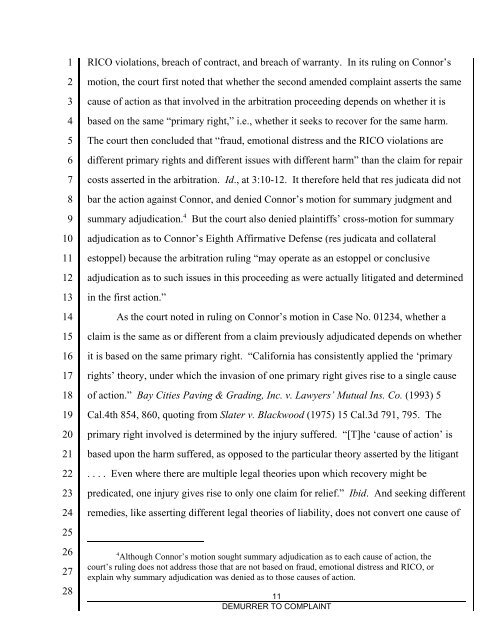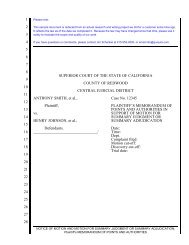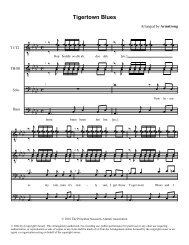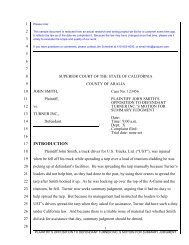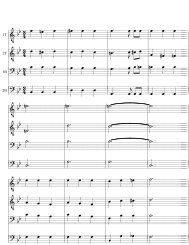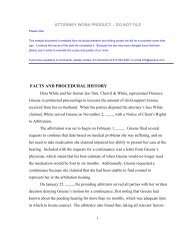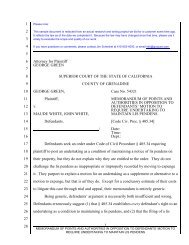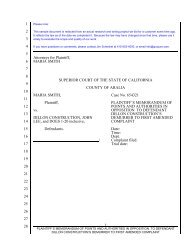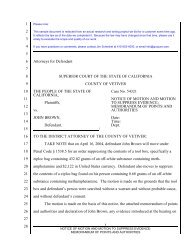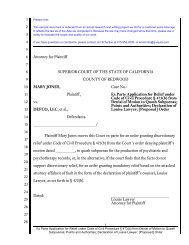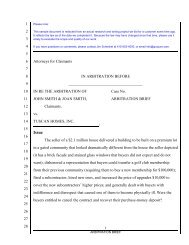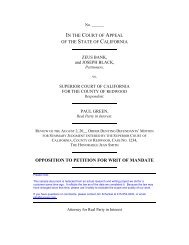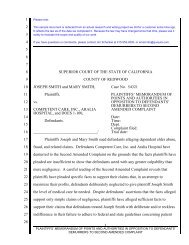Demurrer - Quo Jure Corporation
Demurrer - Quo Jure Corporation
Demurrer - Quo Jure Corporation
Create successful ePaper yourself
Turn your PDF publications into a flip-book with our unique Google optimized e-Paper software.
1<br />
2<br />
3<br />
4<br />
5<br />
6<br />
7<br />
8<br />
9<br />
10<br />
11<br />
12<br />
13<br />
14<br />
15<br />
16<br />
17<br />
18<br />
19<br />
20<br />
21<br />
22<br />
23<br />
24<br />
25<br />
26<br />
27<br />
28<br />
RICO violations, breach of contract, and breach of warranty. In its ruling on Connor’s<br />
motion, the court first noted that whether the second amended complaint asserts the same<br />
cause of action as that involved in the arbitration proceeding depends on whether it is<br />
based on the same “primary right,” i.e., whether it seeks to recover for the same harm.<br />
The court then concluded that “fraud, emotional distress and the RICO violations are<br />
different primary rights and different issues with different harm” than the claim for repair<br />
costs asserted in the arbitration. Id., at 3:10-12. It therefore held that res judicata did not<br />
bar the action against Connor, and denied Connor’s motion for summary judgment and<br />
summary adjudication. 4<br />
But the court also denied plaintiffs’ cross-motion for summary<br />
adjudication as to Connor’s Eighth Affirmative Defense (res judicata and collateral<br />
estoppel) because the arbitration ruling “may operate as an estoppel or conclusive<br />
adjudication as to such issues in this proceeding as were actually litigated and determined<br />
in the first action.”<br />
As the court noted in ruling on Connor’s motion in Case No. 01234, whether a<br />
claim is the same as or different from a claim previously adjudicated depends on whether<br />
it is based on the same primary right. “California has consistently applied the ‘primary<br />
rights’ theory, under which the invasion of one primary right gives rise to a single cause<br />
of action.” Bay Cities Paving & Grading, Inc. v. Lawyers’ Mutual Ins. Co. (1993) 5<br />
Cal.4th 854, 860, quoting from Slater v. Blackwood (1975) 15 Cal.3d 791, 795. The<br />
primary right involved is determined by the injury suffered. “[T]he ‘cause of action’ is<br />
based upon the harm suffered, as opposed to the particular theory asserted by the litigant<br />
. . . . Even where there are multiple legal theories upon which recovery might be<br />
predicated, one injury gives rise to only one claim for relief.” Ibid. And seeking different<br />
remedies, like asserting different legal theories of liability, does not convert one cause of<br />
4<br />
Although Connor’s motion sought summary adjudication as to each cause of action, the<br />
court’s ruling does not address those that are not based on fraud, emotional distress and RICO, or<br />
explain why summary adjudication was denied as to those causes of action.<br />
11<br />
DEMURRER TO COMPLAINT


